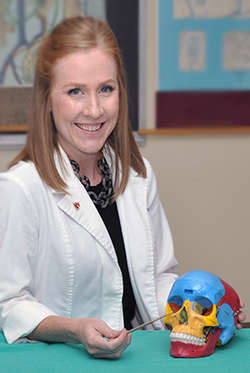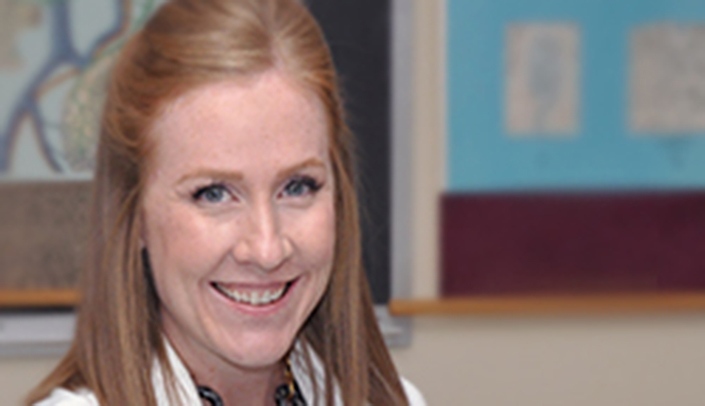
 Shayla Yoachim, PhD, assistant professor of oral biology in the University of Nebraska Medical Center’s (UNMC) College of Dentistry, is one of UNMC’s leaders in remote teaching. She shared her inspirational story and tips for effective remote learning with the UNMC community during a faculty development session, and her students gave her a faculty recognition award for creating an engaging learning experience.
Shayla Yoachim, PhD, assistant professor of oral biology in the University of Nebraska Medical Center’s (UNMC) College of Dentistry, is one of UNMC’s leaders in remote teaching. She shared her inspirational story and tips for effective remote learning with the UNMC community during a faculty development session, and her students gave her a faculty recognition award for creating an engaging learning experience.
The UNMC dental class of 2023 said, "Dr. Yoachim made an extra effort to adapt to our ever-changing class needs and demands. She has an excitement for teaching and her desire to do better is contagious, and that is why she is a fantastic professor."
Yoachim shared the following tips for effective remote teaching:
Consistency is key.
Yoachim creates new lectures for her students to watch independently. By creating new recordings rather than reusing recordings from previous years, she demonstrates her dedication to her current students.
"Creating new lecture recordings and looking directly into the camera mimics the eye contact we know captures the students’ attention and keeps them engaged," Yoachim said.
Furthermore, new lectures allow Yoachim to cater her delivery for that cohort. For example, her current first-year dental class learns best when she chunks the 50 minutes of lecture content into 10-15-minute portions, allowing breaks to review.
"I’ll encourage them to pause, reflect, and talk it through aloud, before moving on," says Yoachim. With a little planning and creativity, she’s able to adapt her lecture delivery to cover the content in an atypical format.
"Knowing your audience and adjusting your delivery to fit the needs of your students is key to creating a productive, engaging classroom. Dedicating my time to prepare material with intention and specificity for my students provides the consistency and normalcy that they crave right now," Yoachim said.
Connect. Early, often, and using a variety of mechanisms.
Yoachim uses Zoom to facilitate casual Q&A sessions.
"These sessions are optional, but nearly all students show up consistently. Frequently, we cover the content in the first half and then spiral into introducing our kids and pets to the class, showing our window views, etc. I’m realizing the second half is just as, if not more, important as the first. We’re all missing ‘normal’ and seeing each other," Yoachim said.
Yoachim also created a private Instagram account where she posts extra practice questions, applies newly-learned content to real life examples, and provides short educational videos. She encourages discussions on her Instagram page, sends frequent emails to students to check in, and offers virtual office hours for one-on-one or small group sessions.
Explore new tools. (Disclaimer: Focus on surviving before thriving; sometimes less is better.)
Yoachim encourages other educators to remember that they’re not alone and everyone is facing similar challenges.
"We can learn from each other’s trials and errors. By staying connected via national association message boards, journals/editorials, personal phone calls, etc., we can share our tips and tricks," Yoachim said.
Furthermore, collaboration has never been more necessary.
"For example, I worked with anatomists from other universities to develop a series of e-modules. It was much more time efficient, and certainly a better product, than if I attempted to tackle that project solo. Lean in to others (+ 6 feet!)."
Above all – Grant yourself, and your students, grace.
"Be realistic in your expectations for both yourself and your students. Be cognizant of the effects this pandemic is having on mental health – students are worried about their families, may be dealing with depression or anxiety, etc. We need to take care of our students through this crisis just as our administration is doing their best to take care of us," Yoachim said.
Yoachim herself is facing many obstacles. She’s is a full-time faculty member, full-time mom to three young boys, and her husband is a health care provider on the front lines of the pandemic.
"You know your course and your students best. Adjusting your content delivery, setting clear and consistent schedules, empathizing with your students on the challenges we’re all facing, and connecting with them often reminds them that you are in this together and that you are devoted to them and their success," Yoachim said.
